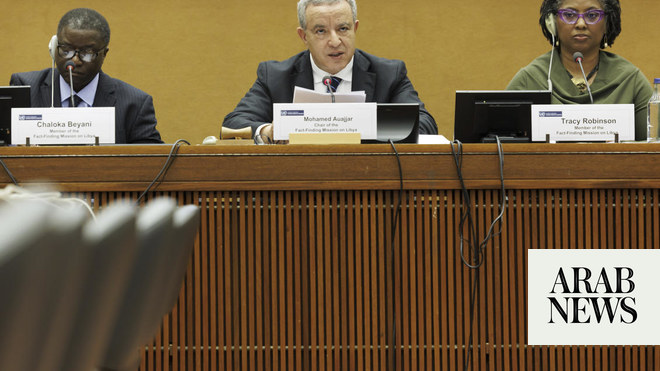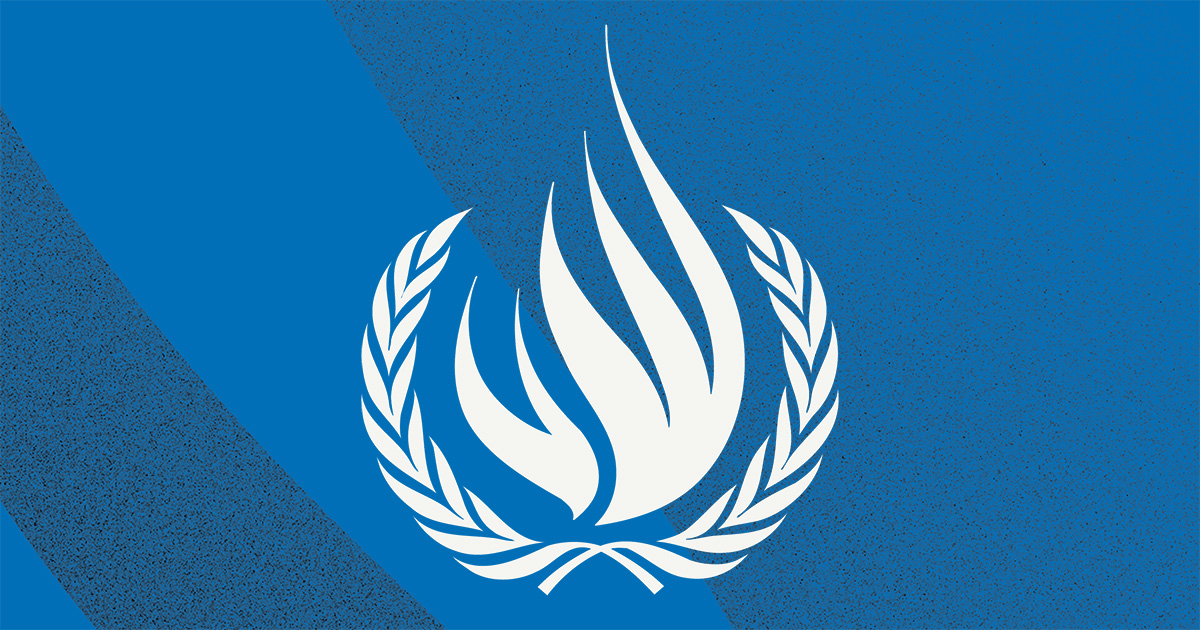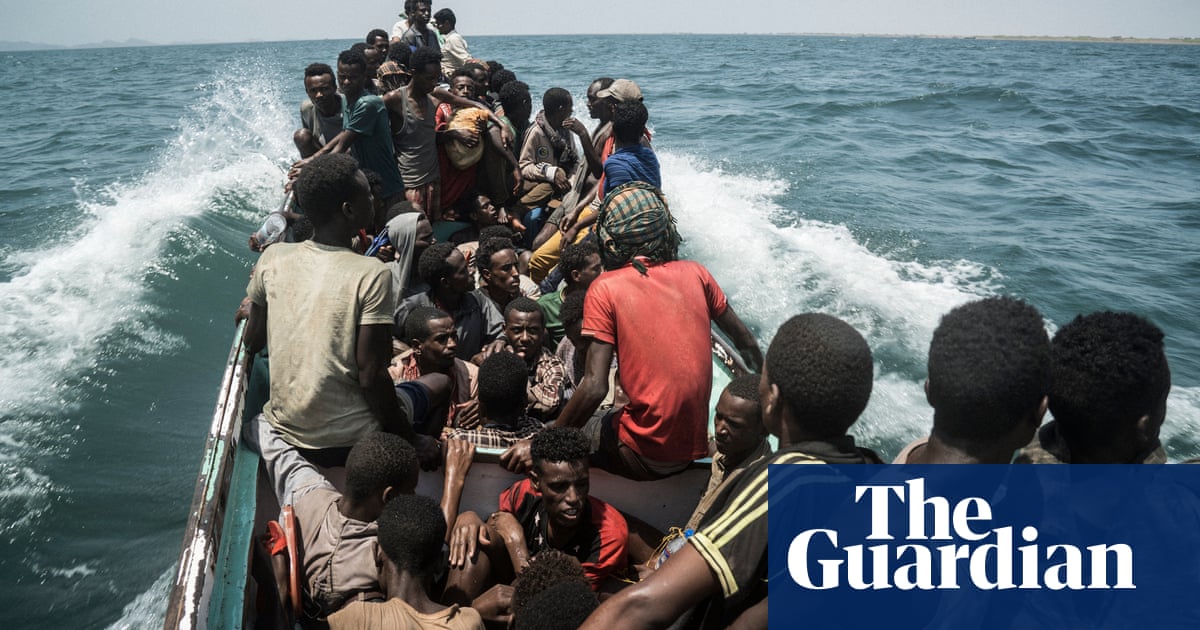
Refugees, migrants and IDPs in the country"s 30-plus detention centers live in deplorable conditions
Despite the pledges made at the UN Global Refugee Forum, the security situation does not inspire confidence
ABU DHABI: The Global Refugee Forum in Geneva last week came at the end of a decade in which the number of refugees rose to more than 25.9 million worldwide, according to the UN. Of these, 51,118 can be found in Libya — a country without security, safety or stability following nine years of bitter conflict.
Guided by the landmark 2018 UN Global Compact on Refugees, the Geneva summit pushed for concrete action on an international response to the crisis. But only time will tell whether the UN’s well-meaning efforts make any difference in Libya, an unlikely home for 700,000 to 1 million migrants, 217,002 internally displaced persons and 278,559 returnees as well as a growing number of refugees.
In October, an agreement under which the Libyan coast guard stops migrant boats headed for Sicily and returns their human cargo back to the country, was automatically renewed. Under the controversial deal, Italy trains, equips and finances the Libyan coast guard.
The same month produced a glimmer of hope in the form of a deal between five EU countries that allowed for temporary relocation of migrants rescued in the central Mediterranean.
Separately, Italy has held talks in recent months with Fayez Al-Serraj, leader of Libya’s Government of National Accord (GNA), and eight EU ministers on investment to fight migrant smuggling in the conflict-ridden country.
A contribution of €800 million ($886 million) has been pledged in addition to commitments made in June totalling €200 million for tackling human trafficking, a large portion of which is earmarked for Libya.
In return, Libya will conduct patrols to turn back smuggling boats and place those found aboard the vessels in camps managed by the GNA in Tripoli rather than in Libyan prisons.
Whether the plan will make a dent in the grim statistics of exploitation of migrants in Libya is a different matter. Medecins Sans Frontieres and the Reuters news agency have both reported that migrants in Bani Walid, southeast of Tripoli, are often detained and tortured as part of extortion rackets.
“There is insufficient food and water, and poor sanitary conditions. There are also widespread reports of human rights violations,” Charlie Yaxley, a UNHCR spokesman, said.
The travails African migrants face on this route is clearly shown by the account of a Cameroonian picked up by a rescue ship in the Mediterranean Sea: “I went to Nigeria, then further north to Niger before entering Libya. I was kidnapped and sent to a clandestine prison, shaken for ransom which my family paid. Was freed and tried to continue journey through Tripoli, but got kidnapped again and found myself in a prison in Bani Walid. It was hell.”
In early November, 200 migrants, kicked out of a detention camp south of Tripoli, marched on the UN’s Gathering and Departure Facility, known locally as “Hotel GDF,” and forced their way inside, joining 800 already camping in a facility designed to hold a maximum of 600, according to the UK’s Guardian newspaper.
And in the most notorious incident of 2019, at least 53 detainees, including six children, were killed in July at the Tajoura detention center in an airstrike allegedly directed by the renegade Libyan National Army.
Following the attack, survivors and rights groups accused the GNA of using migrants as “human shields.”
In fact, abuse of migrants and refugees on Libyan soil goes back many years, predating the European refugee crisis of 2015 and even the 2011 uprising against Muammar Qaddafi.
As early as 2005, the European Commission warned of “deplorable conditions” in Libya’s detention centers.
Yet the country’s approach continued to change from an open-border policy in the 1990s to a strict visa system in 2007. This was accompanied by the building of detention centers across the country and the criminalization of irregular migration, particularly from sub-Saharan countries.
As Libya descended into a chaotic civil war after a NATO-backed uprising toppled and killed Qaddafi in October 2011, control of the detention centers passed into the hands of the shaky new government and various militias.
However, many detention centers stayed linked as some of the biggest militias pledged — on paper, at least — loyalty to the new government even as they preserved their autonomy. What kept the tenuous arrangement alive was the steady infusion of cash in the form of EU emergency funds.
By this time, however, a long list of actors — prison guards, Libyan officials, smugglers and traffickers, corrupt coast guard officers and even EU representatives — had become involved in the coercion and exploitation of irregular migrants.
According to the Global Detention Project, Italy began striking secret deals with Libya as early as 2003, financing detention camps near Tripoli in 2003 and, later, in the south of the country.
In 2017, Italy and the GNA signed an agreement that failed to secure the approval of Libya’s House of Representatives because it stipulated that Libya was to keep hosting a large number of refugees, asylum-seekers and migrants.
Nevertheless, there are unconfirmed reports of informal agreements between Italy and militias operating along the Libyan coast.
In 2018, the Swiss-based IOM, a leading international organization for migration, suggested four practical solutions: Improvements in data collection by the Libyan coast guard, better infrastructure for screening returned migrants, reception facilities along the coast, and the reopening of an IOM shelter for vulnerable migrants that was shut in 2011.
Today, the IOM and the UN refugee agency UNHCR maintain a presence in 16 disembarkation zones along the Libyan coastline. Irregular migrants intercepted at sea by the coast guard are taken to those zones before being transferred to detention facilities.
However, Amnesty International has said the “unofficial detention centers” should be called “places of captivity.”
“Immigration detention is arbitrary and indefinite for many,” it said, adding that for refugees the “only hope of release is through escaping, buying their way out or being sold on to people smugglers.”
Eight years after the death of Qaddafi, Libya remains riven by turmoil and division. And now the stage has been set for a bigger military role for Turkey in Libyan affairs following a GNA deal with Ankara. This dire political and security situation does not inspire hope for those on the perilous migrant route to Europe.












